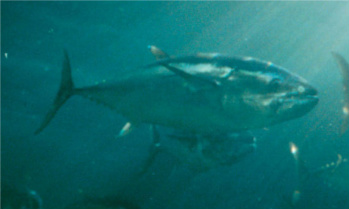Scientists with the International Commission for the Conservation of Atlantic Tuna (ICCAT) have said in a new report that a global ban on Atlantic bluefin tuna fishing is justified. ICCAT meets in November to decide if they will follow their scientist’s recommendations.
ICCAT scientists estimated that the Atlantic bluefin tuna’s spawning biomass is less than 15 percent of its original stock before industrial fishing. The decline is steep enough for the tuna to fall under Appendix 1 of Convention on International Trade of Endangered Species (CITES). The scientists also stated that a total suspension of fishing is the only way for the species to no longer meet Appendix 1 of CITES in ten years time.
 The Atlantic bluefin tuna is a large predatory fish. Photo by: NOAA. |
Environmental groups like the World Wildlife Fund (WWF) and Greenpeace have applauded the conclusions reached by scientists.
“The ICCAT scientists have made formal what we have been saying all along – that Atlantic bluefin tuna is balancing precariously on the edge of collapse, and only drastic measures can now ensure this endangered species gets a fighting chance of recovery,” said Sebastian Losada, Oceans Campaigner for Greenpeace International. “The extent of the failure by ICCAT members to act responsibly and preserve our marine environment can no longer be ignored. Atlantic bluefin tuna has been subject to decades of massive overfishing and overexploitation and time is running out to save this species.”
ICCAT has in the past ignored its scientist’s recommendations by setting a far larger quota than researchers recommended, sometimes even doubling the scientifically-recommended quota.
If ICCAT calls for a total ban on fishing, the decision then goes to CITES, which meets in March 2010.
Classified at Critically Endangered by the IUCN Red List, Atlantic bluefin tuna is primarily sold in Japan for premium sushi. It is a lucrative business: estimated at 7.2 billion US dollars a year. A single fish can sometimes sell for over 100,000 US dollars at the Tokyo Market.
Related articles
Protests over tuna industry development plans in Papua New Guinea
(10/21/2009) People from the area of Madang in Papua New Guinea are protesting government plans, supported by the World Bank’s International Finance Cooperation (IFC), to build large-scale industrial tuna canneries and docks, labeled the Pacific Marine Industrial Zone (PMIZ). Over 700 people showed up and marched at the Madang Provincial Governmental Headquarters on October 15th, despite the protest being banned by local police.
Global fisheries begin to show signs of recovery where management is strong
(07/30/2009) New research reveals hopeful signs that overfished marine ecosystems can recover provided adequate protections. The two-year study, publish in the journal Science, found that efforts to reduce overfishing are beginning to succeed in five of the ten large marine ecosystems examined, suggesting that “sound management can contribute to the rebuilding of fisheries.”
Marine scientist calls for abstaining from seafood to save oceans

(06/08/2009) In April marine scientist Jennifer Jacquet made the case on her blog Guilty Planet that people should abstain from eating seafood to help save life in the ocean. With fish populations collapsing worldwide and scientists sounding warnings that ocean ecosystems—as edible resources—have only decades left, it is perhaps surprising that Jacquet’s call to abstain from consuming seafood is a lone voice in the wilderness, but thus far few have called for seafood lovers to abstain.
Sushi restaurant, Nobu, warns patrons not to eat bluefin tuna, but serves it anyway
(05/27/2009) Last year, Nobu was caught red-handed serving critically-endangered bluefin tuna to patrons, even after servers claimed its tuna was not bluefin. Now after heavy criticism, the trendy restaurant, owned by Robert DeNiro and popular with celebrities, has finally taken action.
Turkey ignores bluefin tuna quotas, further imperiling critically-endangered species
(05/12/2009) A few weeks into the bluefin tuna fishing season and Turkey has decided to go it alone. Breaking international agreements, the Turkish government has announced that it will ignore agreed-upon bluefin tuna quotas. The news is not good for the survival of the critically-endangered fish species, since Turkey operates the largest Mediterranean fleet for bluefin tuna.
Mediterranean bluefin tuna has only three years left unless fishery closes
(04/14/2009) If the Mediterranean bluefin tuna fishery is not closed, the bluefin will be functionally extinct by 2012 according to a new analysis from World Wildlife Fund (WWF). While the population has undergone steep declines for over a decade, fishery managers and policy-makers have continually ignored calls from scientists that fishing must stop if the Mediterranean bluefin tuna is to survive.